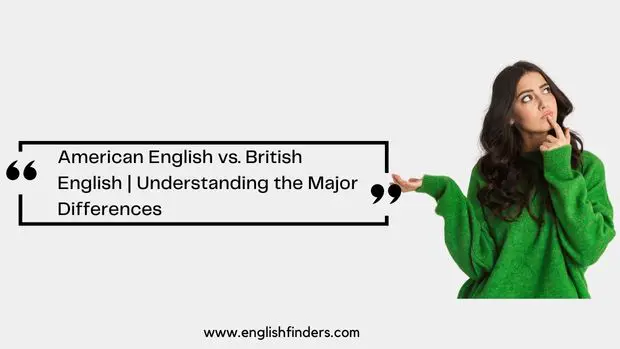Sometimes we have a curiosity about American English vs British English, right? However, language is a crucial aspect of communication in today’s interconnected world. One of the most spoken languages, English, has distinct variations due to regional differences.
American English and British English are prominent variations, each with unique characteristics. This article explores the differences between American English and British English, focusing on spelling, vocabulary, grammar, and pronunciation.
Difference Between American and British English
Quick Navigation
To remove your confusion about American English vs. British English, let’s explore the major differences between American and British English.
Spelling Variations
One of the most noticeable differences between American English and British English lies in their spelling conventions. While both variations are rooted in the same linguistic origins, historical influences, and spelling reforms have shaped their divergence. Some common examples of spelling variations include:
-ize/-ise
In American English, words like “organize” and “recognize” are spelled with a “z,” whereas in British English, they are spelled with an “s” (“organise” and “recognise”). This difference extends to other words that end in “-ize/-ise,” highlighting the contrasting preferences between the two variations.
-or/-our
The suffix “-or” and “-our” also demonstrate spelling discrepancies. For instance, words like “color” and “favor” are spelled with “-or” in American English, while in British English, they are spelled as “colour” and “favour” with “-our.”
-er/-re
In certain words, American English replaces the final “re” with “er.” For example, “center” is used in American English, whereas British English prefers “centre.” This distinction is found in words like “meter/metre,” “theater/theatre,” and “kilometer/kilometre.”
Vocabulary Differences
Beyond spelling variations, American English and British English diverge in terms of vocabulary usage. Due to historical, cultural, and geographical factors, different words have been adopted or developed in each variation. Here are a few noteworthy examples:
Automobile Terminology
When referring to cars, Americans commonly use terms like “trunk” and “hood” for the storage compartment and the front cover, respectively. In contrast, British English speakers use “boot” instead of “trunk” and “bonnet” instead of “hood.”
Everyday Objects
There are numerous instances where different words are used to describe everyday objects. For instance, in American English, a “elevator” is called a “lift” in British English, while a “sidewalk” becomes a “pavement.” Similarly, “apartment” in American English is referred to as a “flat” in British English.
Food Terminology
Food-related vocabulary also showcases variations between the two variations. For example, “cookie” is the preferred term in American English, whereas British English speakers use “biscuit.” Likewise, “fries” in American English are called “chips” in British English, and “chips” refer to “crisps.”
Grammar and Syntax
While the basic grammar and syntax rules remain the same in both American English and British English, there are subtle differences in their usage. These differences mainly involve verb forms, prepositions, and certain grammatical constructions. Here are a few examples:
Verb Agreement
In American English, collective nouns are often treated as singular, whereas British English tends to treat them as plural. For instance, Americans would say, “The team is winning,” whereas British English speakers would say, “The team are winning.”
Prepositions
Prepositions can vary in usage between the two variations. For example, Americans would say “in line” while the British prefer “in a queue.” Similarly, “on the weekend” in American English is expressed as “at the weekend” in British English.
Past Tense
In certain irregular verbs, the past tense differs between the two variations. For instance, Americans use “gotten” as the past participle of “get,” while British English uses “got.” Another example is the verb “learned” in American English and “learnt” in British English.
Pronunciation
Pronunciation divergences between American English and British English are well-known and often a source of distinct accents. These differences encompass vowel sounds, stress patterns, and intonation. Here are a few examples:
Rhotic vs. Non-rhotic
One of the most significant pronunciation variations is the treatment of the “r” sound. In American English, the “r” sound is pronounced in almost all instances, while in British English, it is often not pronounced, particularly at the end of words or before consonants.
Vowel Sounds
There are differences in vowel pronunciation between the two variations. For instance, the vowel sound in “dance” is pronounced differently; Americans pronounce it as a short “a” sound, while the British pronounce it as a long “a” sound.
Stress and Intonation
The patterns of stress and intonation can also differ between American and British English, contributing to the distinct accents associated with each variation. For example, Americans typically emphasize the first syllable of words like “address,” while the British emphasize the second syllable.
Conclusion
American English and British English are two fascinating variations of the English language, each with its own set of spelling, vocabulary, grammar, and pronunciation peculiarities. While they share a common foundation, historical, cultural, and regional influences have shaped them into distinct forms of expression.
Understanding these differences can facilitate effective communication and enable individuals to navigate the nuances of each variation. Whether it’s the spelling of “color” or “colour,” the pronunciation of “dance,” or the choice between “apartment” and “flat,” the divergences between American English and British English add richness and diversity to the English-speaking world.
Frequently Asked Questions
Is American English more widely spoken than British English?
While both American English and British English are widely spoken, the dominance of American English in global communication cannot be ignored. Due to the influence of American media, technology, and culture, American English has become the more prevalent form of English worldwide. However, it’s important to note that British English still holds significant importance, particularly in regions that were formerly part of the British Empire.
Are the spelling differences between American English and British English significant?
Yes, the spelling differences between American English and British English can be significant. While they may seem subtle, these variations can cause confusion and sometimes lead to misunderstandings. However, it’s worth mentioning that the core structure and understanding of the language remain the same, regardless of the spelling differences.
Can a person fluent in American English easily understand British English?
Yes, a person fluent in American English can generally understand British English and vice versa. While there are differences in vocabulary, pronunciation, and accent, overall comprehension remains high. It may take some time to adjust to the variations, but communication between American and British English speakers is usually smooth with exposure and practice.
Are there any grammar differences between American English and British English?
Yes, there are some grammar differences between American English and British English. These differences primarily involve verb forms, prepositions, and certain grammatical constructions. However, the fundamental grammar rules are the same, and understanding these differences is more about familiarizing oneself with the variations rather than learning an entirely different grammar system.
Which form of English should I learn, American English or British English?
The choice of whether to learn American English or British English depends on several factors. If your goal is to communicate effectively in a particular region, learning the form of English used in that area would be beneficial. Additionally, considering the global prevalence of American English, it may be advantageous to prioritize learning American English for international communication. However, both variations have their own cultural and historical significance, so learning about both can enhance your overall understanding and appreciation of the English language.

Azizul Hakim is the founder & CEO of englishfinders.com. He is a passionate writer, English instructor, and content creator. He has completed his graduation and post-graduation in English language and literature.




